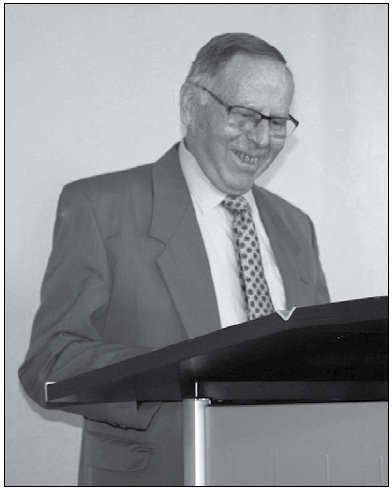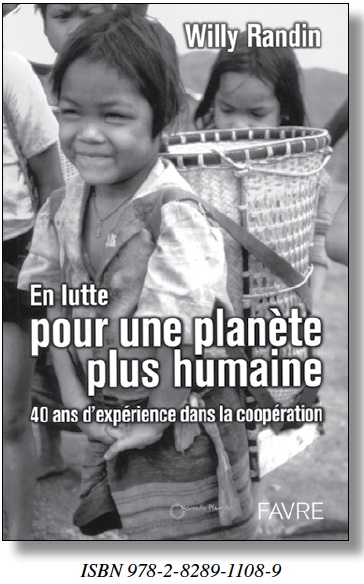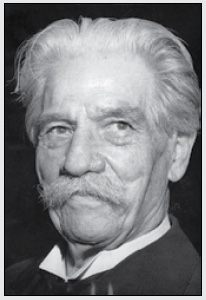Willy Randin honoured with the Albert-Schweitzer-Prize 2017
Willy Randin honoured with the Albert-Schweitzer-Prize 2017
Schweitzer’s works and ideas have strongly influenced his life
by Fritz von Gunten, president SHV
Willy Randin had been awarded and was honoured with the Albert-Schweitzer-Prize 2017 due to his efforts to promote the continuation of the work of Albert Schweitzer. He is the president of the “Swiss Romande Section” and member of the “Albert Schweitzer Hospital Swiss Fellowship”(SHV).


A Life dedicated to the work of Albert Schweitzer
“Schweitzer’s works and ideas have actually strongly influenced my life. Not only did I have the privilege of being the director of the Albert-Schweitzer-Hospital in Lambarene and to visit the Albert-Schweitzer-Hospitals in Haiti, Peru and India, as well as bringing to life many organisations which meet the goal and purpose of the same intention” maintained the honoured person with modesty. Afterwords came the briefly named “building blocks” of the life achievements of Willy Randin, which despite – or perhaps because of – his age of 81 years is not yet over.
In the service of the Red Cross
Randin directed two Red Cross hospitals in Yemen (1965) and Vietnam (1966–1968), both countries at this time were affected with war. In Vietnam, he was a head of delegations and assigned to the construction of a children’s hospital. Furthermore he was responsible for helping the 250,000 persons needing to evacuate their homes.
The example which Albert Schweitzer has given him, he considers as current as ever. The main idea of Schweitzer’s “Revenue for life” means that “Today’s people should be even more aware, because they are provided with technology in such a dimension that the intrinsic values of life are no longer perceived. This maxim contains three parts: the respect for humans, for animals and for nature which means for the environment.”
Organisation “Nouvelle Planète”
Willy Randin was guided by these principles when founding the Organisation for Development Cooperation “Nouvelle Planète/New Planet” as well as “Youth without borders”, “Women without Borders”, of the “Albert-Schweitzer-Environmental Organisation” etc. Also diverse partnerships among professional groups, communes and other entities come from the desire for more solidarity.
The honoured has primarily tried to motivate young people through volunteer work with African, Asian, and Latin American teenagers by mastering projects. The goal was the bridging of the borders and obstacles, the contact with others, just as he is, what he knows, what he can and will do. 32 years after these initiatives, 10,000 young Europeans and just as many people from the Southern part of the earth have enriched their lives with a positive experience which will continue and grow.
Director in Lambarene from 1970–1971
After having led the Albert-Schweitzer-Hospital in Lambarene, he visited countries in the Sahel, where he noted the major damage caused by the drought.
The residents had to leave their villages without knowing where to go. Around the hospital built by Dr Ken Elliott in Djibo (Bukina Faso) in the sense of Albert Schweitzer, Willy Randin found hundreds of people suffering from hunger. Dr Ken Elliott told him that all he could give them was a bowl of millet with some sauce, and that only every two days. This food contains no vitamins and the children were at risk of blindness.
“Centre Ecologique Albert Schweitzer”
He felt compelled to act because of the peasants’ requests in the dry Sahel zone and in memory of Schweitzer‘s words on ethics of responsibility. He found that the lack of rain was a consequence of the reduced tree population because the wood was used for cooking and therefore the trees were cut down.
But he also found that the tanning in this region is three times stronger than in southern France. Willy Randin therefore thought of using solar energy instead of wood. He asked Maurice Lack, the architect of the new hospital in Lambarene, for advice, and they set themselves the goal
- to set up an environmental protection studio “Centre Ecologique Albert Schweitzer” in Ouagadougou (Burkina Faso) to use solar sensors, to produce solar ovens, solar water heaters and solar refrigerators;
- to train local craftsmen to make and maintain the solar devices and to produce other utensils necessary for the careful handling of wood (manual pumps, lattice enclosures).
Today, 37 years later, there are already 64 ATESTA workshops (Ateliers d’Energie Solaire and Technologies Appropriées) in 10 African countries. They all are self-sustaining and provide a safe livelihood for 4,000 local craftspeople who are useful to their country and their people.
Of course, it is not enough only to save wood. You also have to reforest. Thanks to Willy Randin‘s initiative, villagers have been shown from the beginning how to make compost, grow seedlings and plant trees.
- The women immediately accepted the production of compost and crops.
- The population immediately realised that by winning new cultural soil, the progression of the desert could be stopped. After only five years, a fertile soil is once again created where crops and vegetables thrive.
- The women produced dried fruits and vegetables and were encouraged in their suggestions to pass on their knowledge to apprenticeships, where girls have the same training opportunities as the boys.
- The most gratifying achievements have been in the construction of primary schools in those villages where women have campaigned. Girls’ education has increased from 20 to 45 per cent in several countries.
- Finally, family planning programmes have been initiated – also at the request of the women – as only every second child is desired.
We also feel our responsibility in view of the massive flows of migrants and refugees across the Mediterranean, which mean enormous risks.
Bookpublications and films
In addition to many concrete aid projects, Willy Randin has kept his wealth of experience in numerous books in French since 1981 and left as a stimulus for reflection. There are titles (translated) such as: “Hopeful signs”; “Albert Schweitzer, a model today”; “Effective cooperation”; “Development – future of the woman”; “Mountain dwellers in Vietnam – consecrated lifeline”; “From enthusianism to action”; “Women, sources of progress”; “Fight for a more humane earth”. Together with his wife Henriette numerous films were produced, altogether 25 contributions from his diverse work! (If you are interested in books/film documents, please contact: w.randin@nouvelleplanete.ch)
Outlook and thanks
Schweitzer’s work today certainly has dimensions that the Alsatian pioneer would not have dreamed of. For example, in addition to the listed organisations, there is also a Philippine Association for the rescue of street children and in Burkina Faso an Association for animal protection and reverence for life. These are just a few examples of how Willy Randin and his team show the way for a future in the sense of their role model Albert Schweitzer: In a future, which the 81 year-old honore will continue to help shape.
As the president of the Albert Schweitzer Hospital Swiss Fellowship, I can only say: Congratulations on your deserved honor. Great respect, thanks – Willy. Good health for your tireless zest. You are a great role model for us all. •
Source: Berichte aus Lambarene und über das Gedankengut Albert Schweitzers, Nr. 124, Oktober 2017 (Reports from Lambarene and the thoughts of Albert Schweitzer, No 124, October 2017)
(Translation Current Concerns)
Reverence for life

wikipedia)
“I call mankind to the ethics of the reverence for life. This ethic makes no distinction between more valuable and less valuable, higher and lower life. It rejects such a distinction. Because the assumption of universally valid differences in value between living things basically amounts to judging them according to whether we humans feel them to be closer or less close to us. But this is a very subjective criterion. Who among us knows what significance the other living being has in itself and for the world as a whole? The consequence of this distinction is then the view that there is worthless life the destruction or impairment of which is permitted. Depending on the circumstances, we then understand insects or primitive peoples as worthless life.
Man is directly conscious of the following fact: ’I am life that wants to live, in the midst of life that wants to live.‘ This general affirmation of life is a spiritual act in which man ceases to just simply exist, in which he begins rather to dedicate himself to honouring his life and to according it its true value. At the same time, the man who thinks like this, experiences the necessity of showing the same reverence for life to all will to live as he does to his own. So he experiences the other life in his own. He then considers as good the preserving and promoting of life, the bringing developable life to its highest value – as evil he now sees: to harm or destroy life, to hinder developable life in development. This is the absolute and necessary principle of morality. Through the ethics of reverence for life, we enter into a spiritual relationship with the world.
In my life, I have always tried to remain youthful in my thinking and feeling and have struggled ever anew with the facts and with my experience, for the belief in the good and the true. In this day and age, when violence hides behind lies and rules the world more sinisterly than ever before, I remain convinced that truth, peacefulness and love, gentleness and kindness are the powers that are beyond all power. The world will belong to them when only enough people think and live pure and steadily enough the thoughts of love and truth, gentleness and peacefulness.
All ordinary violence in this world creates a limit for itself, for it creates a counter-force that sooner or later will be equal or superior to it. But goodness is simple and continuous. It does not create any tension that neutralises itself, but instead relieves the existing tension. It eliminates mistrust and misunderstandings. By awakening kindness, it strengthens itself. That is why it is the most appropriate and most intense power. What kindness a person gives to the world, will work on the hearts of people and their thinking. Our foolish guilt is that we do not dare to be serious about kindness. We always want to pass on the big burden, and we do not use this lever, which can increase our strength a hundredfold.”
From: Albert Schweitzer. “Mein Wort an die Menschen (My word to the people)”, Lambarene 1964
(Translation Current Concerns)